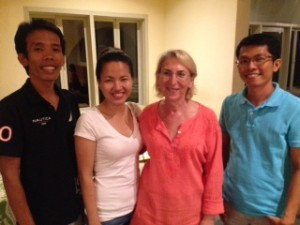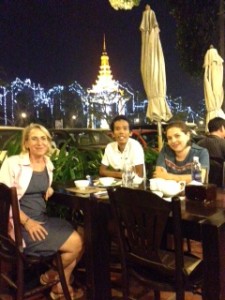I spent this past week in Phnom Penh. I come every year. I have always loved its craziness, its mass of humanity on the streets, the astonishing juxtaposition of developed and undeveloped. Mostly now, though, it is a city full of friends, and I spent many nights this past week seeing them and enjoying the city at night.
But despite all that, I was here to work. I spent the week training a group of Khmer teachers in the methodology and pedagogy of the Writing Through program. I may have put these methods together in my own way, but really, in the West, there is nothing all that new in how I teach my workshops. But to Cambodians, all these methods are like bolts from the blue. Their own methods of teaching are so very different, all about rote memorisation, giving information in a lecture form and expecting it to be returned the same way. English lessons mean teaching the future imperfect and how to spell ‘knowledge.’ And the strict hierarchical distance between student and teacher is always maintained. This, at least, is how teachers are taught to teach. Of course, there is the question of who is teaching the teachers. Anyone who was a teacher during the Khmer Rouge rule of the late 1970’s was killed. Any one who showed signs of being educated to any degree was killed. So who is teaching the teachers? Teacher training is therefore a huge issue here, and I’m very happy that my own program, which began as one geared solely towards students, can now branch out to this other very important, and needy, sector.
The NGO Enfants du Mekong offered my training session, which lasted for 4 days of 4 hour sessions, to both their own teachers and staff, as well as those from other nearby NGO’s. It was a fascinating group of people who came, some teachers, some not. Some with excellent English skills, some with minimal skills. Some with very flexible and open minds, others less so. But everyone wrote poetry. Everyone wrote stories. And here’s my favourite anecdote of the week. One of the oldest participants was a man who taught math in a huge NGO here in Phnom Penh which helps support the education of over 6,000 students here. I’m not sure what spurred him to come along to this training in the first place. He seemed unsure of himself and the programme from the start, and being that bit older (in his late 30’s) meant that his own life experience and training was more rigid. But at the end of the last day, he came over to me and showed me a 3-page story he had written the evening before on his own. “Will you help me with this, Teacher?” he asked me. Sure, the grammar needed some work, but really, who cares about that? Not me. Grammar and spelling are easily fixed. But the story was full of heart and caring for students and the future of his country. It was absolutely beautiful and I told him so. As he left he had tears in his eyes. It doesn’t take much to have a huge impact in this country. Certainly, that’s one of the reasons why I love it so much here.



Recent Comments